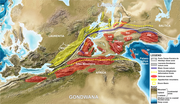The Lopingian is the uppermost series/last epoch of the Permian. It is the last epoch of the Paleozoic. The Lopingian was preceded by the Guadalupian...
11 KB (924 words) - 15:03, 13 December 2024
end-Guadalupian extinction event, the Guadalupian-Lopingian boundary mass extinction, the pre-Lopingian crisis, or the Middle Permian extinction, was an...
70 KB (7,504 words) - 19:10, 1 January 2025
Temnospondyli (section Late Permian (Lopingian))
Temnospondyli (from Greek τέμνειν, temnein 'to cut' and σπόνδυλος, spondylos 'vertebra') or temnospondyls is a diverse ancient order of small to giant...
170 KB (17,521 words) - 19:22, 5 November 2024
or tough stone) is a unit of sedimentary rock layers of Late Permian (Lopingian) age located in the European Permian Basin which stretches from the east...
5 KB (638 words) - 23:41, 12 December 2024
Permian (252–299 Ma) Lopingian (252–260 Ma) Guadalupian (260–272 Ma) Cisuralian (272–299 Ma) Carboniferous (299–359 Ma) Pennsylvanian (299–323 Ma) Mississippian...
69 KB (7,587 words) - 19:09, 1 January 2025
Permian (252–299 Ma) Lopingian (252–260 Ma) Guadalupian (260–272 Ma) Cisuralian (272–299 Ma) Carboniferous (299–359 Ma) Pennsylvanian (299–323 Ma) Mississippian...
115 KB (12,088 words) - 23:54, 2 January 2025
Permian (252–299 Ma) Lopingian (252–260 Ma) Guadalupian (260–272 Ma) Cisuralian (272–299 Ma) Carboniferous (299–359 Ma) Pennsylvanian (299–323 Ma) Mississippian...
88 KB (9,330 words) - 07:12, 2 January 2025
Permian (252–299 Ma) Lopingian (252–260 Ma) Guadalupian (260–272 Ma) Cisuralian (272–299 Ma) Carboniferous (299–359 Ma) Pennsylvanian (299–323 Ma) Mississippian...
41 KB (4,344 words) - 15:09, 19 December 2024
Pangaea created huge arid inland areas subject to temperature extremes. The Lopingian Epoch is associated with falling sea levels, increased carbon dioxide...
35 KB (3,708 words) - 15:09, 19 December 2024
Permian (252–299 Ma) Lopingian (252–260 Ma) Guadalupian (260–272 Ma) Cisuralian (272–299 Ma) Carboniferous (299–359 Ma) Pennsylvanian (299–323 Ma) Mississippian...
95 KB (9,956 words) - 17:09, 1 January 2025
Permian (252–299 Ma) Lopingian (252–260 Ma) Guadalupian (260–272 Ma) Cisuralian (272–299 Ma) Carboniferous (299–359 Ma) Pennsylvanian (299–323 Ma) Mississippian...
234 KB (25,320 words) - 17:10, 1 January 2025
Permian (252–299 Ma) Lopingian (252–260 Ma) Guadalupian (260–272 Ma) Cisuralian (272–299 Ma) Carboniferous (299–359 Ma) Pennsylvanian (299–323 Ma) Mississippian...
71 KB (7,714 words) - 15:04, 19 December 2024
Permian (252–299 Ma) Lopingian (252–260 Ma) Guadalupian (260–272 Ma) Cisuralian (272–299 Ma) Carboniferous (299–359 Ma) Pennsylvanian (299–323 Ma) Mississippian...
79 KB (7,814 words) - 19:58, 25 December 2024
Permian (252–299 Ma) Lopingian (252–260 Ma) Guadalupian (260–272 Ma) Cisuralian (272–299 Ma) Carboniferous (299–359 Ma) Pennsylvanian (299–323 Ma) Mississippian...
59 KB (5,820 words) - 15:10, 19 December 2024
reducing the peaks to around half their original size by the Late Permian (Lopingian) and creating numerous deep intermontane valleys. By the Middle Triassic...
6 KB (562 words) - 20:05, 11 December 2024
measures almost 4,300 feet (1,300 m) in total and was formed during the Lopingian Epoch. The individual layers (laminae) of gypsum/anhydrite are between...
59 KB (7,016 words) - 04:43, 17 November 2024
Permian. The Guadalupian was preceded by the Cisuralian and followed by the Lopingian. It is named after the Guadalupe Mountains of New Mexico and Texas, and...
16 KB (1,580 words) - 14:53, 13 December 2024
million years ago 9.7 Lower Triassic 251.9 to 246.7 million years ago 5.202 Lopingian 259.51 to 251.9 million years ago 7.608 Named for Loping, China, an anglicization...
177 KB (10,065 words) - 23:15, 4 January 2025
survived into the Permian. Nevertheless, lycopodiopsids are rare in the Lopingian (latest Permian), but regained dominance in the Induan (earliest Triassic)...
26 KB (2,530 words) - 19:55, 31 December 2024
Permian (252–299 Ma) Lopingian (252–260 Ma) Guadalupian (260–272 Ma) Cisuralian (272–299 Ma) Carboniferous (299–359 Ma) Pennsylvanian (299–323 Ma) Mississippian...
24 KB (2,473 words) - 21:01, 23 December 2024
Triassic is the oldest epoch of the Mesozoic Era. It is preceded by the Lopingian Epoch (late Permian, Paleozoic Era) and followed by the Middle Triassic...
42 KB (4,079 words) - 14:46, 13 December 2024
Wang and Xiao-Juan Wang (2007). "Extinction patterns of Late Permian (Lopingian) corals in China", Palaeoworld, 16, No. 1–3, 31–38 Ries JB, Stanley SM...
110 KB (12,258 words) - 16:35, 25 December 2024
Permian (252–299 Ma) Lopingian (252–260 Ma) Guadalupian (260–272 Ma) Cisuralian (272–299 Ma) Carboniferous (299–359 Ma) Pennsylvanian (299–323 Ma) Mississippian...
14 KB (1,153 words) - 15:14, 13 December 2024
Trilobite (category Lopingian extinctions)
Trilobites (/ˈtraɪləˌbaɪts, ˈtrɪlə-/; meaning "three lobes") are extinct marine arthropods that form the class Trilobita. Trilobites form one of the earliest...
112 KB (11,973 words) - 00:13, 28 November 2024
Conodont biostratigraphy (section Lopingian)
appear. The top of the Capitanian (the base of the Wuchiapingian and Lopingian series) is defined as the place in the stratigraphic record where Clarkina...
20 KB (2,203 words) - 10:13, 15 April 2024
remarkable sea-level drop and relevant biotic responses across the Guadalupian–Lopingian (Permian) boundary in low-latitude mid-Panthalassa: Irreversible changes...
22 KB (2,305 words) - 11:38, 27 November 2024
is an extinct genus of mylacridid insect known from fossils from the Lopingian of Zimbabwe. It is a monotypic genus known from a single species, R. bondi...
1 KB (87 words) - 09:16, 14 October 2024
stem-group relatives have been reported from as early as the Late Permian (Lopingian) The extinct conifer cone genus Schizolepidopsis likely represent stem-group...
29 KB (3,062 words) - 12:24, 1 January 2025
Cynodontia (category Lopingian first appearances)
form the clade Eutheriodontia. The earliest cynodonts are known early Lopingian (early Wuchiapingian) aged sediments of the Tropidostoma Assemblage Zone...
26 KB (2,103 words) - 08:09, 27 December 2024

























